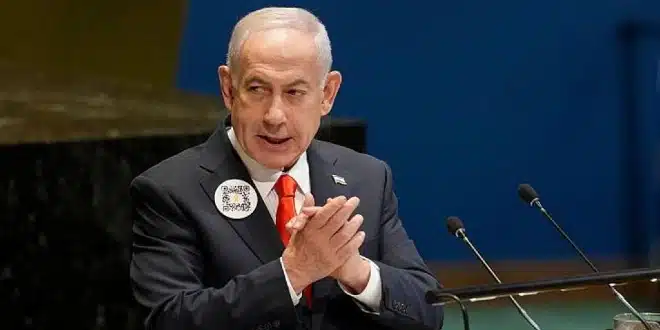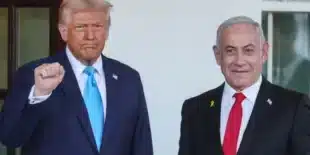Israeli Prime Minister Benjamin Netanyahu delivered a fiery speech at the United Nations on Friday, vowing to block the establishment of a Palestinian state and accusing European powers of endangering Israel’s future. His remarks came just days after several Western nations formally recognized Palestinian statehood, intensifying global divisions over the Gaza war.
Netanyahu’s Defiant Stand at the U.N.
Speaking with anger and determination, Netanyahu declared that Israel would “finish the job” against Hamas, despite U.S. President Donald Trump suggesting progress on a potential ceasefire deal. He accused countries such as France and Britain of rewarding terrorism by recognizing Palestine, arguing that the move sends “a very clear message that murdering Jews pays off.”
In his address, parts of which were reportedly broadcast over Israeli military loudspeakers in Gaza, Netanyahu warned, “Israel will not allow you to shove a terrorist state down our throats. We will not commit national suicide because you don’t have the guts to face down the hostile media and antisemitic mobs demanding Israel’s blood.”
The remarks underscored Netanyahu’s long-standing opposition to a Palestinian state, a stance he has held for decades. While some of his cabinet ministers have openly called for annexing the West Bank, Netanyahu did not directly address that issue in his speech.
Tensions With Allies and Trump’s Ceasefire Push
Despite his combative tone, Netanyahu reserved praise for Donald Trump, whom he is set to meet in Washington on Monday. Trump has cautioned Israel against annexation plans as he promotes a broader peace initiative that envisions the disarmament of Hamas and new security arrangements in Gaza. Shortly after Netanyahu’s speech, Trump stated, “I think we have a deal,” suggesting that negotiations toward a ceasefire may be advancing.
This contrast highlights a delicate moment: Netanyahu is doubling down on military objectives, while Trump, usually a staunch ally, is pushing for diplomatic compromises.
Protests, Walkouts, and a Controversial Arrival
Netanyahu’s appearance in New York was marked by controversy. Facing an International Criminal Court warrant over alleged war crimes, including accusations of using starvation as a weapon, he traveled to the U.N. via an unusual route over the Strait of Gibraltar.
As he approached the General Assembly podium, several delegations walked out in protest, having come solely to make a symbolic exit. Still, Netanyahu received loud applause from supporters inside the chamber, some of whom he invited to watch from the gallery.
Outside the U.N. and near his hotel, demonstrators rallied against him. Protesters in Times Square demanded his arrest, with one participant saying, “War criminals don’t deserve any peace of mind. They don’t deserve any sleep.”
Responding to War Crimes Allegations
Netanyahu strongly rejected accusations of genocide in Gaza. He argued that Israel has consistently warned civilians through leaflets and other messages before military strikes, framing these actions as evidence of restraint.
Yet humanitarian law also considers mass displacement a potential war crime. Nearly the entire population of Gaza—over 2 million people—has been forced from their homes during the conflict. According to official figures, Hamas’s October 7, 2023 attack killed 1,219 people, mostly civilians, making it the deadliest day in Israel’s history. In response, Israel’s military campaign has resulted in more than 65,500 Palestinian deaths, the majority of them civilians, based on figures from Gaza’s health ministry that the United Nations deems credible.
Addressing Hostages and Iran
Part of Netanyahu’s speech was aimed directly at Hamas and the hostages still held in Gaza since the October 7 attack. Switching briefly into Hebrew, he declared: “We have not forgotten you—not even for a second. The entire nation is with you, and we will not be silent or let up until we bring you all home, the living and the dead alike.”
His message, however, contrasted with growing frustration among hostage families in Israel, many of whom have demanded a ceasefire as the only viable path to rescuing their loved ones.
Netanyahu also revisited tensions with Iran, referencing a bombing campaign against the country’s nuclear facilities ordered months earlier. During the speech, he dramatically displayed a map of the Middle East and crossed out adversaries Israel has targeted. In response, Iran boycotted his address, placing photographs of those it said were killed in Israeli strikes on its delegation’s table.


